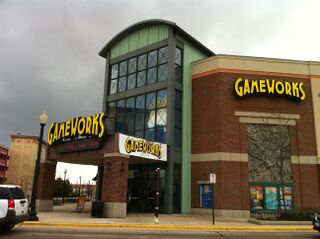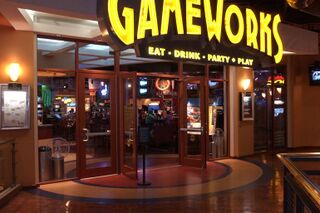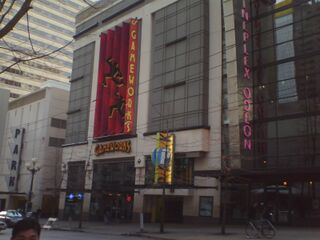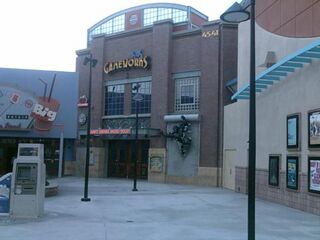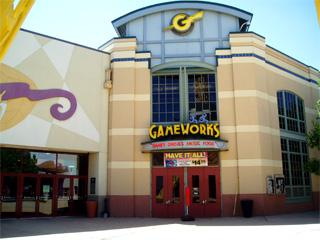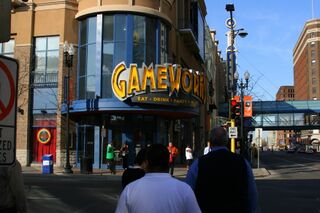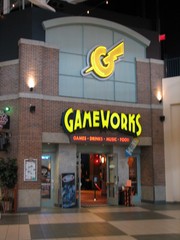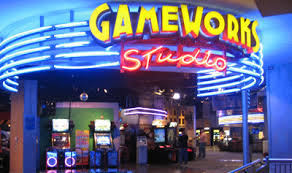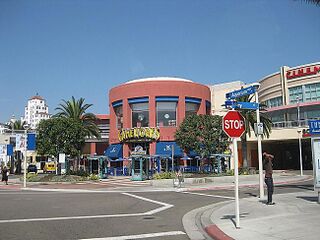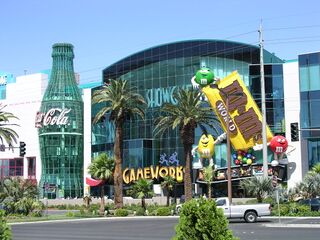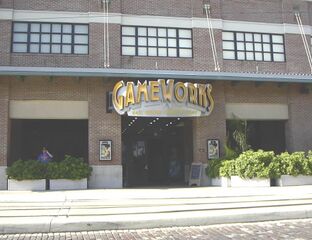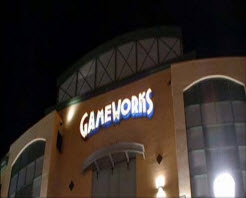Difference between revisions of "GameWorks"
From Sega Retro
| Line 10: | Line 10: | ||
==History== | ==History== | ||
| − | The first GameWorks was created by Steven Spielberg and opened in Downtown Seattle in March, 1997 to much fanfare{{intref|Press release: 1996-12-04: FIRST GameWorks PLAYS IN DOWNTOWN SEATTLE, MARCH 1997}} | + | The first GameWorks was created by Steven Spielberg and opened in Downtown Seattle in March,{{intref|Press release: 1997-03-15: BECK AND COOLIO TO PERFORM AT MTV'S GameWorks PREMIERE PARTY SPECIAL LIVE FROM THE GRAND OPENING OF GameWorks SATURDAY, MARCH 15 IN SEATTLE, WA}} 1997 to much fanfare{{intref|Press release: 1996-12-04: FIRST GameWorks PLAYS IN DOWNTOWN SEATTLE, MARCH 1997}} |
. A typical facility cost about $10 million or more to build, and plans initially called for up to 150 locations. After earnings of the first stores proved disappointing, the scope of the chain was scaled back significantly. Nonetheless, Sega estimated that at its height, the 18 U.S. locations that existed drew in over 15 million guests per year. | . A typical facility cost about $10 million or more to build, and plans initially called for up to 150 locations. After earnings of the first stores proved disappointing, the scope of the chain was scaled back significantly. Nonetheless, Sega estimated that at its height, the 18 U.S. locations that existed drew in over 15 million guests per year. | ||
Revision as of 04:54, 5 November 2017
GameWorks is a chain of entertainment venues featuring arcade games, simulators, redemption prizes, and full-service bars and restaurants. It was created in 1996 as a joint venture between Sega, Universal Studios, and DreamWorks SKG. GameWorks venues began opening across the United States in 1997, replacing the Sega City arcades as the United States' version of Sega's Joypolis and Sega World projects.
As of 2011, GameWorks is no longer owned or operated by Sega, with the majority of original venues having been closed.
Contents
Operations
GameWorks was (and still is) home to many Sega arcade games, from old classics like OutRun to the very newest state-of-the-art simulators. Sega pinball machines, UFO Catchers, imported Japanese games, and uncommon Sega arcade titles such as Monkey Ball could be found at some venues. The Schaumburg, Illinois venue had Virtual Bowling, and many locations had interactive driving simulators such as Indy 500. Games were played by loading a Play Card with credits, and then swiping the card through a reader on each game. Tokens could be purchased for redemption games, which dispensed tickets that could be exchanged for prizes. Some GameWorks venues were used by Sega's arcade development teams as test locations for games such as The Lost World: Jurassic Park and Daytona USA 2: Battle on the Edge (the latter which features a large GameWorks logo as scenery in one of the racetracks).
Like Sega's other indoor amusement venues, Sonic the Hedgehog was the mascot of GameWorks until their 2011 sale, and was featured on the chain's merchandise, redemption prizes, children's menus, party decorations, and as a costumed character.
History
The first GameWorks was created by Steven Spielberg and opened in Downtown Seattle in March,[1] 1997 to much fanfare[2] . A typical facility cost about $10 million or more to build, and plans initially called for up to 150 locations. After earnings of the first stores proved disappointing, the scope of the chain was scaled back significantly. Nonetheless, Sega estimated that at its height, the 18 U.S. locations that existed drew in over 15 million guests per year.
Smaller venues which lacked the bar and restaurant aspect of the chain were titled GameWorks Studios and were usually placed in shopping malls.
Due to the costs involved in the venture, DreamWorks SKG withdrew their involvement in 2001, and the chain itself filed for bankruptcy in 2004. NBC Universal's stake in GameWorks was sold to Sega Sammy Holdings on November 3, 2005, making it wholly-owned by SEGA and was operated by its subsidiary, Sega Entertainment USA until May 2011.
GameWorks began to struggle financially in the late 2000s as a result of an economic downturn in the United States. As part of a major restructuring move, Sega Entertainment USA suddenly closed down seven GameWorks venues on March 29, 2010, in an attempt to focus the chain's mission on profitability and future growth. Employees and patrons were greeted with a sign on the door explaining the sudden closure of the venue. Sega Entertainment USA reported that as a result of the closure, GameWorks employees at the closed locations lost their jobs, although some received 30 days of wages. The ten remaining locations and the World Sports Grille in Tucson were to become the focus of renewed efforts going forward.
In May 2011, Sega sold GameWorks, which now consisted of only seven locations, to an investor group headed by theme park and arcade chain veteran Steve Dooner. Now known as Gameworks Entertainment LLC, the company has moved its headquarters from the Chicago suburbs to Las Vegas. Dooner, GameWorks' new chief executive, said he originally tried to buy Gameworks in 2001 and discussed the possibilities of making the acquisition a second time in 2004 before the chain was declared bankrupt. His third and successful round of negotiations with Sega began in January 2010.
Dooner planned to revitalize GameWorks by making broad changes to technology, menus and marketing, increasing the company's emphasis on social media, and eventually opening new locations. Though the franchise is no longer affiliated with Sega, some theming and redemption prizes are still based off of Sega game franchises. Today, only 6 of the GameWorks locations SEGA opened are still in business.
Locations
(Note: this does not include locations post Sega's 2011 sale)
United States
Schaumburg, Illinois (with The House of the Dead 4 Special, Street Fighter IV arcade machines and new Stern pinball games on test)
Tucson, Arizona (GameWorks Studio) (reopened as World Sports Grille in 2008, also operated by Sega)
International
Locations never built
- Milwaukee, Wisconsin (struck down in the Pabst City project vote)
- Westbury, New York (though a sign outside the Source mall touted its arrival, it never materialized; instead, 'Jillians' took over the location which is now Dave & Busters)
- Harrisburg, Pennsylvania (building built in Harrisburg Mall but the project was abandoned in the wake of the financial crisis of 2007–2010)

